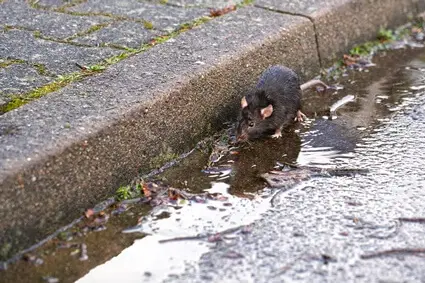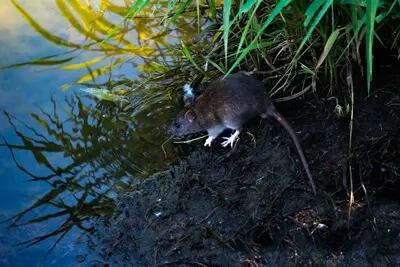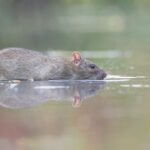Rats can live near water bodies and hunt around pools, lakes, and rivers. This makes you wonder if rats have a natural preference for water bodies or if they make do.
Rats prefer to live near water bodies while spending most of their time on dry land. Water bodies such as rivers, lakes, streams, and ponds offer food sources for rats.
These locations are brimming with aquatic life, including fish, worms, and edible plants, which rats readily hunt and consume when hungry.
Rats require water to survive, so living near water sources benefits them.
They can drink water without having to cover long distances. Rats can hold their breath for long periods, tread water for several days, and conserve energy while swimming.
Do Wild Rats Like Water?
It’s often assumed that wild rats are afraid of water. In truth, rats like water and often build their nests near water bodies. Ideal places for rats to live include:
- Rivers.
- Streams.
- Ponds.
- Lakes.
That’s because there are many natural advantages for a rat living near water, including:
Feeding Opportunities
Rivers, ponds, and streams are teeming with aquatic life forms.
These can range from fish to earthworms, algae, and other plants, all of which a rat can feed on. By gaining easy access to this food supply, rats don’t need to work as hard to keep themselves well-fed.
Living near water bodies is advantageous for rats since it allows them to feed on the available flora and fauna without foraging long distances.
The plentiful food in water bodies provides the perfect conditions for rats to breed and raise their pups. Their offspring won’t need to travel far or contend with as many predators to get the food they need.

Supply of Drinking Water
Wild rats need water to survive. So, establishing nests close to water bodies is beneficial since it ensures they have a dependable source of drinking water.
Without a reliable water supply in their environment, wild rats may be forced to travel long distances searching for this valuable resource.
Although rats can defend themselves, these long treks are often dangerous since they put them at risk of predator attacks. These include wild cats, raccoons, and ferrets.
Cool Themselves in Hot Weather
While rats are resilient creatures capable of surviving in varied environmental conditions, they’re still susceptible to extreme weather.
When the temperatures in their environment rise beyond the optimal levels, they may overheat and suffer heatstroke. This can cause significant organ damage and even death.
Since rats can’t sweat, they must find alternative ways to cool their bodies when the weather becomes too hot. Fortunately, living near water bodies allows them to take dips to reduce their body temperature.
In particular, rats expand the blood vessels in their tails and feet to let blood circulate more frequently, which carries heat to them.
Submerging in cool water saps out the heat and allows the rat to circulate the cooler blood back into its body. This reduces its temperature and will enable it to survive in hotter conditions.
Good Swimmers
We know that rats can run, climb, and jump long distances. However, in addition to these feats, rats are skilled swimmers, so they have no problem living near water bodies.
According to the University of Nebraska, rats can swim up to ½ a mile and tread through water for up to 3 days, even with strong currents.
Their ability to change the rate at which they paddle with their feet makes it possible for them to swim long distances without succumbing to fatigue.
If that isn’t impressive enough, rats can hold their breath underwater for up to 3 minutes. Due to their collapsible rib cages, they can also swim in tight spaces.
Are Rats Attracted to Water?
Rats are attracted to water sources since these locations allow them to meet their feeding and hydration needs. Water bodies like ponds, streams, and rivers contain aquatic life forms that rats can hunt for food.
Similarly, water bodies provide a steady drinking water supply, thus eliminating the need to move long distances in search of hydration. Rats need water every day.
If rats can’t secure it outdoors in their immediate environment, they’ll venture into people’s homes in search of it. This is why leaving pet bowls unattended can attract rats to your house.
Canals
Canals have an abundance of flora and fauna, making them desirable nesting and breeding locations for rats. Since rats are great swimmers, they can dive into canals to hunt for food.
Common prey includes:
- Small fish.
- Birds.
- Earthworms.
- Algae.
- Plants.
Rats can dive into the waters to flee predators and pursuers.
Lakes
Wild rat populations can be found in the areas surrounding large water bodies, including lakes. They like to live near lakes since there’s lots of food in these locations.
Some of the foods that rats can hunt and forage for near lakes include:
- Fish.
- Worms.
- Snails.
- Slugs.
- Corals.
- Algae.
Living near lakes also provides rats with a reliable supply of drinking water.
Rivers
Rats like to live near rivers since they can easily access aquatic plants and animals, including:
- Fish.
- Frogs.
- Small birds.
- Bird eggs.
As mentioned, rats are expert swimmers, capable of paddling for long distances, even in fast-moving water currents. Therefore, they can hunt and forage for food in rivers.
Swimming Pools
Swimming pools are usually appealing to rats since they offer drinking water. In addition, swimming pool equipment such as pumps, heaters, and filters provide warm nesting locations.
While the chlorine found in pools is off-putting, rats can learn to tolerate and overcome this dislike based on the other advantages a swimming pool offers.

Are Rats Attracted to Standing Water?
Rats are fond of water bodies and build their nests close to them. Still-water bodies like ponds and canals are attractive to rats.
They’re easier to swim in than fast-moving water currents in rivers and streams. In addition, they contain plants and animal life, which rats can hunt for food.
Do Rats Like Damp Places?
Rats love to hang around moist areas since these locations provide drinking water.
While mice can survive on the water content in their food, rats can’t. So, they’ll often set up their nests in moist locations to easily access water.
Can Rats Live Inside Water?
Rats are terrestrial creatures, meaning they don’t have the physical adaptations to live in water for long periods.
However, rats are capable swimmers who can wade through open waters for up to 3 days. They can also hold their breath underwater for up to 3 minutes and swim up to half a mile without drowning.
According to Frontiers in Physiology, rats can vary their swimming force and paddling rate to conserve energy, allowing them to cover greater distances without exhaustion.







